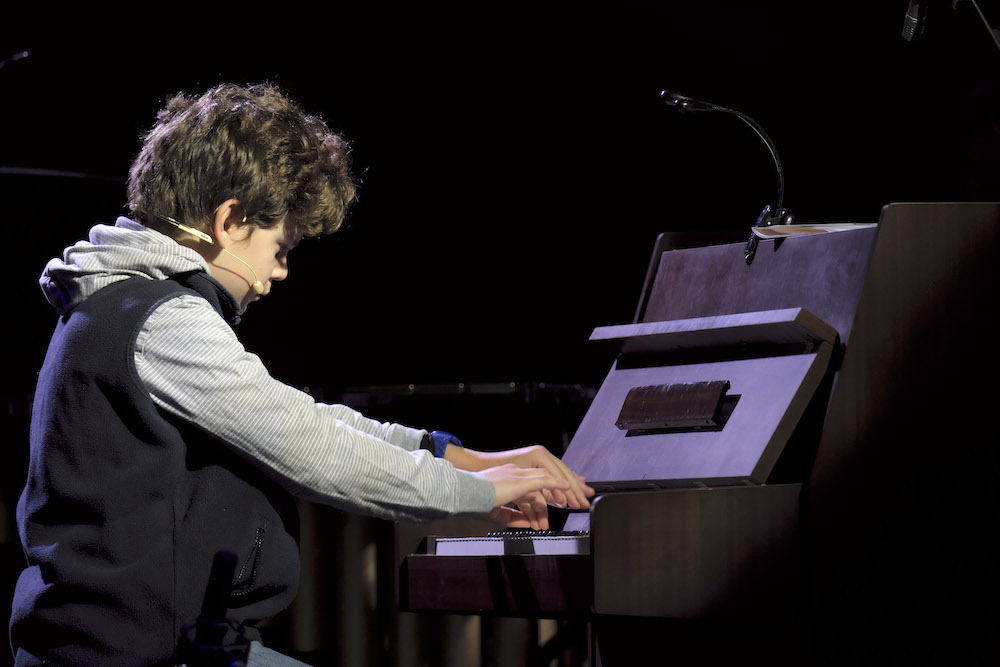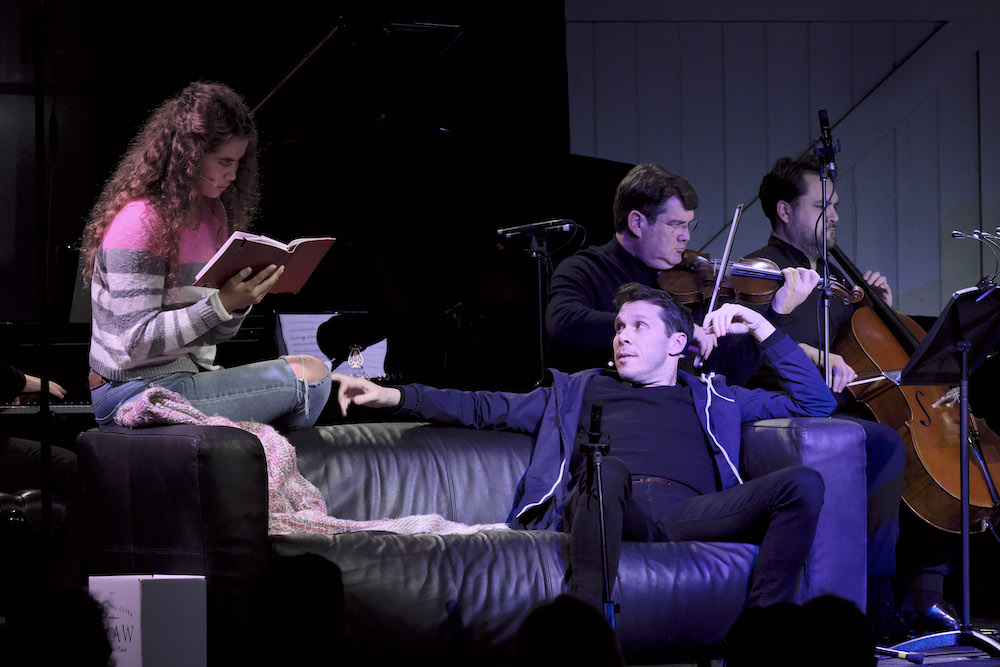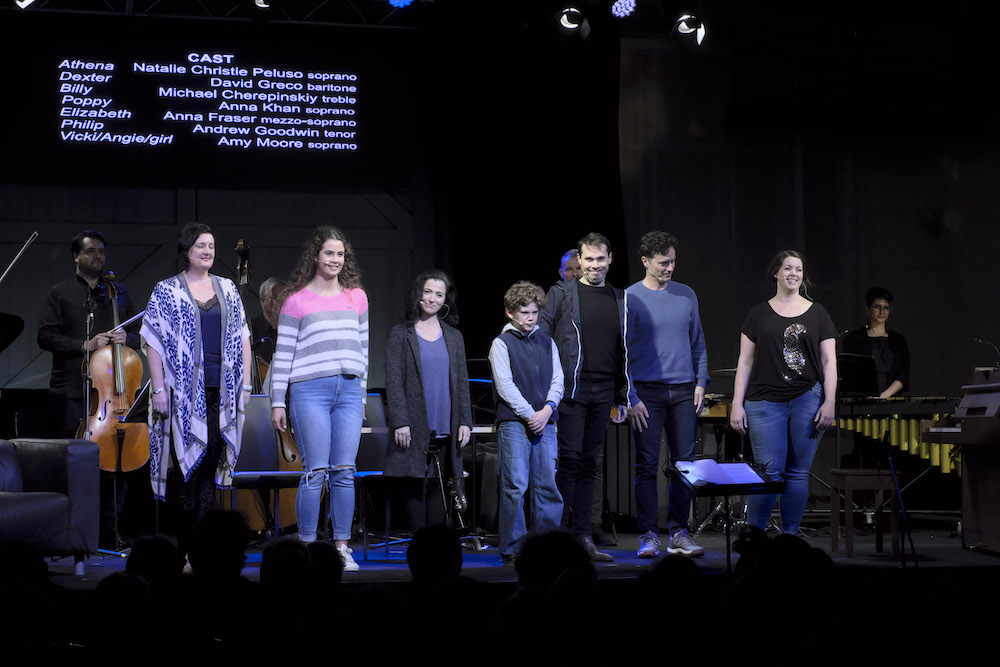For many Australians, the first contact with the music of Bach would have come with the publication in 1932 of The Children’s Bach, edited by Professor E.Harold Davies of Adelaide. It comprised 20 short pieces Bach wrote for his own ‘family use’. Davies dedicated his modest volume “to the children of Australia in the hope that they will find in it the beginnings of a life-long love and appreciation for the greatest music-composer of all the ages”.
 The Children’s Bach at Canberra International Music Festival. Photo © Peter Hislop
The Children’s Bach at Canberra International Music Festival. Photo © Peter Hislop
The Children’s Bach is also the title of the acclaimed novella by Helen Garner, first published in 1986, with three further editions since then. It revolves around the lives of a Melbourne couple, Dexter and Athena Cox, and their two boys. In Glenn Perry’s compressed yet eloquent libretto for Andrew Schultz’s opera, we meet only one boy, Billy, who has a form of autism and whose principal engagement with the world of sound appears to be by means of the family upright piano.
Into an already strained domestic environment strides Elizabeth, an old flame from Dexter’s university days, and her 17-year-old sister Vicki, as well as her current flame, Philip, a rock singer and his musical daughter Poppy. Various romantic entanglements ensue and the action moves to Sydney, not before the Melbourne of The Pram Factory, the Burstalls and the early film industry have been invoked.
 The Children’s Bach at Canberra International Music Festival. Photo © Peter Hislop
The Children’s Bach at Canberra International Music Festival. Photo © Peter Hislop
In 2007, Schultz began discussions with Douglas Horton, director of Chamber Made Opera in Melbourne. They hit upon the idea of turning Garner’s novella – barely 160 pages in its most recent edition by Text Publishing (2018) – into an opera. As she told a forum in the National Library on Saturday morning, Garner was “flabbergasted” by the idea. She had no idea how her story would be sung.
Schultz produced his 120-minute score in just seven months. It was commissioned by Chamber Made with the aid of a Project Fellowship from the Music Board of the Australia Council and the R.E.Ross Trust Playwrights Script Development Awards. It was first performed by Chamber Made at The Malthouse, Melbourne, in June 2008. The Canberra performance, just over a decade later, is the work’s first outing since its premiere.
In a sense, that is both sad and revealing, because The Children’s Bach should be a gift to Australian regional opera companies. It has a contemporary Australian setting with which many of us can identify and is scored for modest resources, a cast of seven and a chamber ensemble of six. Unlike the astringency of Schultz’s earlier opera Black River (1988), this work has a softer palette and invites comparisons with the likes of Bernstein’s A Quiet Place, both in terms of its musical language and domestic setting.
In the context of a 23-event festival centred on a Re/Discovery of Bach, the inclusion of a contemporary chamber opera was an inspired stroke. It enhanced the thesis that Bach is timeless, that his music can offer spiritual redemption and psychological healing, and that we each create our ‘own Bach’. Each of these ideas is addressed in the score. Each character approaches music quite differently, each ‘personalises’ his response to Bach.
Essentially, the Canberra performance in the Fitters Workshop was a concert presentation, with singers in casual dress sitting on couches at the side of the stage, venturing centre stage when required and singing their roles from memory.
The cast was uniformly very good, especially the two sisters Elizabeth, played by Anna Fraser, and Vicki, played by Amy Moore, whose long peroration-duet at the work’s close drew many in the audience close to tears. As the married couple, Dexter and Athena, David Greco and Natalie Christie Peluso sang and acted with cold conviction. Tenor Andrew Goodwin, as the pop star Philip, was perhaps a mite too saccharine, but Anna Khan, as his teenage daughter Poppy, embodied the very essence of teenage rebelliousness. For many in the audience, special affection was reserved for the young tousled-hair Billy, Michael Cherepinskiy, who remained mute throughout, but for an attempt to articulate the ‘Skye Boat Song’ and occasional thrashings of the piano which eventually yielded to the sweetness of a Minuet. This was the only direct quotation, Schultz confessed, of Bach himself.
 The Children’s Bach at Canberra International Music Festival. Photo © Peter Hislop
The Children’s Bach at Canberra International Music Festival. Photo © Peter Hislop
The ensemble sextet was centre stage, with director Roland Peelman conducting from floor level. Without enlarged stage settings and direction, lighting and costuming, the focus fell squarely on the music. As it should be, one might say: Schultz is a deeply thoughtful composer, with a sophisticated yet not intimidating language of his own. His music throws up ideas and debate long after a performance has ended.
Like many of the projects mounted by Peelman, CIMF’s Artistic Director since 2015, The Children’s Bach invited its audience to consider issues that may help determine the result of our federal election a week from now – mental health, domestic issues and homelessness, among them. Regardless of that outcome, the chamber opera deserves a wider place in our cultural environment.
The Canberra International Music Festival takes place at venues around Canberra until May 12












Comments
Log in to join the conversation.